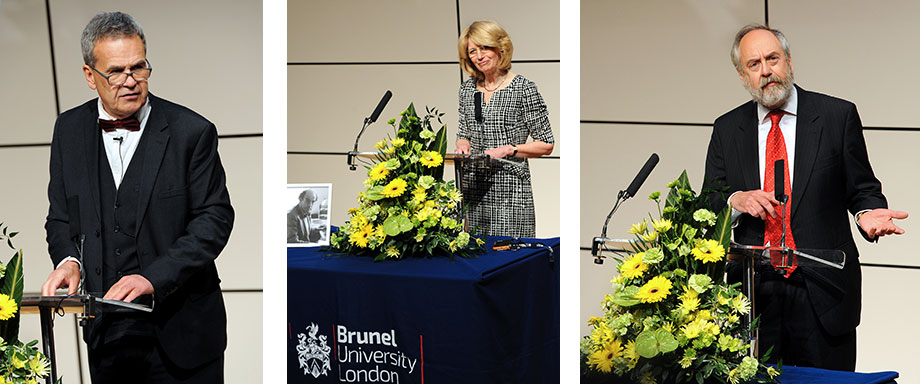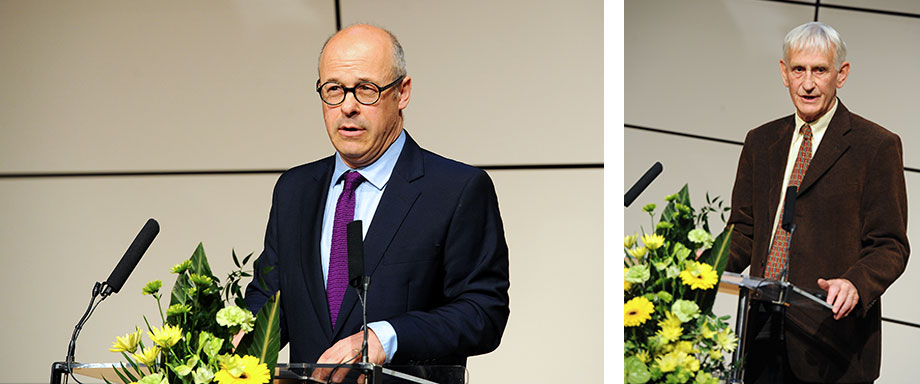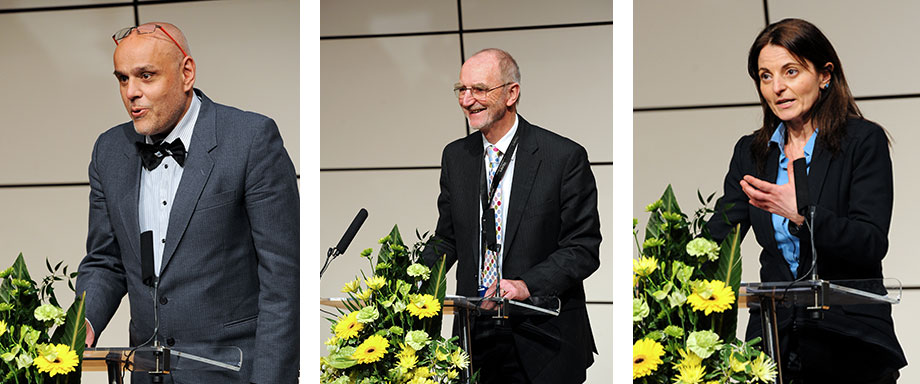'To Heinz Wolff – something of a genius.' Nobel Laureate Sir Peter Medawar's dedication to his former colleague featured in the order of service for the late Brunel scientist and TV presenter's memorial, and set the scene for a celebration of Professor Heinz Wolff's life and many achievements.
Prof Wolff's family, friends and colleagues gathered at Brunel University London on 30 April to remember the pioneer of bioengineering, inventor, TV presenter and social reformer, who died on 15 December 2017, aged 89.
"It's not really very surprising to me that people have come from far and wide to be with us today," remarked Brunel's Vice-Chancellor and President, Professor Julia Buckingham, introducing the memorial. "To put it simply, Heinz was a remarkable man who touched all our hearts in many, many different ways."
The service, compered by Brunel's former Director of Corporate Relations, Andrew Ward, featured tributes from several of those who had been closest to Prof Wolff.

Andrew Ward, Professor Julia Buckingham and Rabbi Dr Jonathan Romain MBE
Rabbi Dr Jonathan Romain MBE spoke from the perspectives of a rabbi, a family friend and a fellow son of a refugee. Prof Wolff's story, Rabbi Romain explained, was the story of a generation: lives disrupted by Nazi Germany, with Heinz arriving in the UK with his family on the day World War Two broke out.
"Maybe we can wonder what might have happened had not the Nazis arisen," mused Rabbi Romain. "Heinz would certainly have been as brilliant and inventive, but might we now be paying tribute to an eminent professor not of Brunel but of Berlin University?
"And the BBC? They would never have had The Great Egg Race," – referring to the popular TV programme of the 1970s and 1980s, presented by Prof Wolff – "but perhaps those watching German TV would have been thrilled by Der Große Eierlauf.
"But what we can say for sure is that Germany's loss was Britain's gain, and we are grateful that his life is part of our life too."

Laurence Wolff and Dr David Neave
Laurence Wolff spoke fondly of how his father married his staff-nurse sweetheart Joan, who provided Prof Wolff with immense support to his career over their 60 years together. The couple established a loving family of curious minds.
"In some respects, they were unusual parents," Laurence said, before introducing his father's ideas about vitamin R, where the R stands for 'risk'. "There can't have been many families where the under-10s had propane cylinders and Bunsen burners on workbenches in their bedrooms, along with proper, sharp, heavy tools.
"As he said more than once, even a three-year-old stops sawing before their finger actually falls off."
In a switch of emotion, Joan's voice was heard in a recording of her singing 'The Man I Love', which Prof Wolff chose as one of his Desert Island Discs when he appeared on the Radio 4 programme in 1998.

Suresh Paul, Professor Ian Sutherland and Dr Gabriella Spinelli
When Prof Wolff was keen to move his research team to a university in 1983, Alex Pelican offered to help, and approached Brunel's then Secretary-General and Registrar, Dr David Neave. This approach was initially dismissed as a hoax: "A pelican wanting to talk to me about a wolf?" Dr Neave said, incredulously. But six weeks after a discussion with the then Vice-Chancellor, and the earmarking of some empty prefab space on the campus in Uxbridge, the team moved in and BIB was born: the Brunel Institute for Bioengineering.
Former BIB student and Suresh Paul spoke of how the Institute was a vibrant, eclectic place full of magical people, and how Prof Wolff encouraged him to create a company to design products for and inspire inclusive adventure, sport and active lifestyles with disabled people.
Colleague and close friend Professor Ian Sutherland, who took over directorship of the Institute when Prof Wolff retired, spoke of a man always ahead of his time. Prof Sutherland introduced video tributes from people who were unable to attend the memorial – including Dr Helen Sharman, who in 1991 became the first Briton in space as a result of Project Juno, which Prof Wolff co-founded.
"But Heinz can be attributed to many more astronauts in space than just Helen," revealed Prof Sutherland. Prof Wolff's Glovebox, a facility for astronauts to conduct experiments in space safely, was originally a European Space Agency project, but was given to the USA's NASA in exchange for flight opportunities.
In addition to Prof Wolff's numerous inventions and achievements, Prof Sutherland spoke about how Heinz's sense of fun would be an enduring memory: "He always had a twinkle in his eye, like the day he said to me, 'Wouldn't it be fun if gravity changed from day to day, like the weather?'".
The last tribute was given by Brunel's Dr Gabriella Spinelli, who worked with Prof Wolff in recent years to launch the 'Give and Take Care' time-banking initiative for care of elderly people. The legacy of this idea lives on, with Dr Spinelli expanding the initiative to new localities across England.

The memorial was followed by a reception in which the food and drink were themed as scientific experiments, and where attendees could share their own memories of Prof Wolff and his legacy for them – just a few of the huge number of people, at Brunel and across the world, who had been inspired and touched by Prof Wolff's life.
Reported by:
Joe Buchanunn,
Media Relations
+44 (0)1895 268821
joe.buchanunn@brunel.ac.uk